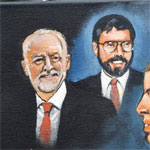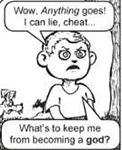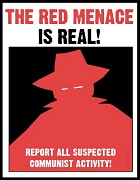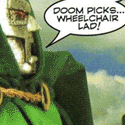|
Dave Graeber definitely has a relevant perspective on the current round of poo poo. https://www.youtube.com/watch?v=H6oOj7BzciA e: 1790s, Britain begins the first organized otter hunts, which turn out to be bad. Guavanaut fucked around with this message at 01:05 on Jun 28, 2020 |
|
|
|

|
| # ? May 27, 2024 18:06 |
|
idk where else to post this but the 25th anniversary of the srebrenica massacre is approaching, and that plus us about to brexit i feel like there's discussion to be had about what "europe" actually is, what its purpose is, etc. does anyone know of any good articles, docs, etc exploring the relationship between the yugoslav wars, sectarianism and ethnic conflict in europe up to the present, and the role of the EU in the wars themselves, their relationship to the balkan states today, etc?
|
|
|
|
Guavanaut posted:Dave Graeber definitely has a relevant perspective on the current round of poo poo. I can't watch the last few minutes of Ring of Bright Water. Makes me sob.
|
|
|
|
Jaeluni Asjil posted:No but I like some of the tunes that go on games Are you perhaps familiar with a gentleman named Keiki Kobayashi? https://www.youtube.com/watch?v=ML4Jx76vSTk https://www.youtube.com/watch?v=8L2TsEp-Nxw https://www.youtube.com/watch?v=Zg5guTIUhZM https://www.youtube.com/watch?v=-kVdCaczLE8
|
|
|
|
gh0stpinballa posted:idk where else to post this but the 25th anniversary of the srebrenica massacre is approaching, and that plus us about to brexit i feel like there's discussion to be had about what "europe" actually is, what its purpose is, etc. does anyone know of any good articles, docs, etc exploring the relationship between the yugoslav wars, sectarianism and ethnic conflict in europe up to the present, and the role of the EU in the wars themselves, their relationship to the balkan states today, etc? Well this is just one thing, don't know if it contributes to what you want: how the European Parliament pulled an exhibition on the massacre. https://www.aljazeera.com/news/europe/2018/07/11-lessons-srebrenica-genocide-unwelcome-brussels-180711151335396.html quote:An exhibit titled Genocide in Srebrenica: Eleven Lessons for the Future has opened in Sarajevo, Bosnia and Herzegovina, after it was turned away from its original event location in Brussels by certain members of the European Parliament (EP) for displaying "too many skulls and bones".
|
|
|
|
Jaeluni Asjil posted:Well this is just one thing, don't know if it contributes to what you want: how the European Parliament pulled an exhibition on the massacre. yes, this is in the ballpark. i think as well as politicking, the EU is also still mightily embarrassed that the same year they were celebrating the end of history and all that, a genocidal series of wars kicked off in europe. and when they weren't indifferent, EU member states were busy arming their preferred clients and so on.
|
|
|
|
there is also the role islamophobia played too, we forget that a lot of european politicians still buy into talk of "christian europe" and all that. bosnia was/is seen as a country of outsiders in that regard.
|
|
|
|
gh0stpinballa posted:there is also the role islamophobia played too, we forget that a lot of european politicians still buy into talk of "christian europe" and all that. bosnia was/is seen as a country of outsiders in that regard. Friend of mine who lives in Egypt is from Slovenia. She is a muslim and wears the long black abaya and headscarf (but doesn't cover her face). She said Slovenians are very anti-muslim and it's quite tough if, as she is, your interpretation of Islam is that she must cover to the extent that she does. (By no means do all muslims agree). On the other hand she is a great supporter of Tito (She's early 40s so she would have been a small child at the time) on the grounds that 'everyone has a free house, free health and a good education and ok he killed 100000 people, but that was worth it and dictatorship is essentially of benefit. I did ask her if she would like to volunteer her kids to be in the 100000 but she didn't answer that.
|
|
|
|
we have none of those things and a minimum 180k dead
|
|
|
|
Jose posted:we have none of those things and a minimum 180k dead On the other hand the population of Slovenia is about 2m. (I don't know what the pop of Yugoslavia was). In 1987 population of Yugoslavia was 23.4m and that of the UK now is 66.65m so 100k of 23.4 m is equivalent to about 285k of UK now. I'm surprised how small the Yugoslavia pop was. Jaeluni Asjil fucked around with this message at 02:03 on Jun 28, 2020 |
|
|
|
gh0stpinballa posted:yes, this is in the ballpark. i think as well as politicking, the EU is also still mightily embarrassed that the same year they were celebrating the end of history and all that, a genocidal series of wars kicked off in europe. and when they weren't indifferent, EU member states were busy arming their preferred clients and so on. https://foreignpolicy.com/2020/01/13/white-christian-west-us-them-identity-christiantity-islam-we-are-not-who-we-think-we-are/ This article is essentially a review of this book https://www.hurstpublishers.com/book/how-the-west-was-lost/ but it loads the pay wall screen too quickly to capture it - I skim read it through the right click 'view page source' option on google chrome - seems to cover things you mention. Here are a couple of paras from the 'view page source' option: quote:As far as Ryan is concerned, Westerners themselves are to blame for it—because a critical mass of them no longer seem persuaded by the current formulations of what it means to be Western, and thus the West fails to be a convincing proposition altogether. Yet, as Ryan posits, there is a chance to rescue the West from its own travails—if only Westerners could construct a new myth to gather around as they move forward in the 21st century.
|
|
|
|
Jaeluni Asjil posted:https://foreignpolicy.com/2020/01/13/white-christian-west-us-them-identity-christiantity-islam-we-are-not-who-we-think-we-are/ quote:
|
|
|
|
Jaeluni Asjil posted:I can't watch the last few minutes of Ring of Bright Water. Makes me sob.
|
|
|
|
thanks for these links asjil
|
|
|
|
this is a great piece of writing http://glineq.blogspot.com/2017/09/how-i-lost-my-past.html?m=1 quote:In almost all recent literature that analyzes Br-exit and Trump-entry, there is a constant theme of a fall from the heady days at the end of the Cold War, of pining for a time when unstoppable victory of democracy and neoliberal economics was a certainty and liberal capitalism stood at the pinnacle of human achievement. gh0stpinballa fucked around with this message at 02:00 on Jun 28, 2020 |
|
|
|
gh0stpinballa posted:this is a great piece of writing You've got me remembering a film I saw years ago - Shot Through the Heart - about the war in Sarajevo. (Fiction but based on a true story). quote:(from wiki) I think at the time I saw it couldn't imagine people who had been such firm friends becoming enemies but having lived through the revolution and its aftermath with Morsi then Sisi and now here with Brexit and seeing it happen in real time, it's all too believable.
|
|
|
|
Jaeluni Asjil posted:You've got me remembering a film I saw years ago - Shot Through the Heart - about the war in Sarajevo. (Fiction but based on a true story). you should check out pretty village pretty flame, that's a similar story of two friends fighting on opposite sides in bosnia. very dark comedy too. yeah the real reckoning wrt brexit is still coming, i hope we can brace for impact cos of its sky fallin in levels of bad well...look at the football lads in london the other week. arkan's gammon.
|
|
|
|
OwlFancier posted:
You mean, ‘We are all us’?
|
|
|
|
The Tories just murdered tens of thousands of people in an attempt not to disrupt businesses in the country too much, so I suspect that they will settle for what is basically a soft Brexit with some minor concessions (that the EU get way more in return for) and the Tory media will largely herald it as an unmitigated triumph because the only paper left that actually wants hard Brexit is the Express.
|
|
|
|
Comrade Fakename posted:The Tories just murdered tens of thousands of people in an attempt not to disrupt businesses in the country too much, so I suspect that they will settle for what is basically a soft Brexit with some minor concessions (that the EU get way more in return for) and the Tory media will largely herald it as an unmitigated triumph because the only paper left that actually wants hard Brexit is the Express. A full no-deal gets bad thought against him in the Times and other outlets that he doesn't want denouncement in.
|
|
|
|
gh0stpinballa posted:you should check out pretty village pretty flame, that's a similar story of two friends fighting on opposite sides in bosnia. very dark comedy too. OK found the first 20 mins of that film online - have to pay 5Euros to see the rest but as it is 3am I am going to bed! https://easterneuropeanmovies.com/comedy/pretty-village-pretty-flame
|
|
|
DickEmery posted:Does anyone know of a serious counterpoint to Graeber's argument? Other posters have highlighted the flaws already but I do think he’s right about the professional/managerial class functioning as ablative armour for the 0.1%. Most people have no interactions with the ridiculously wealthy and so the targets of righteous anger are always society’s NCOs. I suspect this also ties into the rash of corporate sackings of / suspensions of serial abusers or harassers after they are outed. It seems clear to me that these people are not a few bad apples, but are instances of a harmful system; also that what gets them sacked isn’t their abusive behaviour as such, but the possibility that it will threaten the wealth of the shareholders of the companies they work for. You can see the same thing here in China when officials get arrested for corruption: the individuals are necessary sacrifices to keep the system going (from the perspective of the people who actually run the system). radmonger posted:You mean, ‘We are all us’? Surely “I fought, we won”?
|
|
|
|
|
gh0stpinballa posted:this is a great piece of writing there's often very little literature in postcolonial countries that is set in the interregnum between the initial national awakening and dash to independence (with the exception of India). It can be before, or after, but that period in between... it's the 'colonial space' - that life of hill stations, clubs, forts and cantonments, education in the metropole, long journeys by sea. That life existed and may have applied to a surprisingly large number of social groups making up the nativized civil service - not just the white colonial elite - but there is little enthusiasm for memorializing its high society, even as (or especially because) those same native elite groups largely went on to govern their successor states the past is already a foreign country, it doesn't help if it is literally so I don't see that observation on Yugoslavia to be different, really; it's not a conspiracy to whitewash the successes of Yugoslav socialism (if it can be called as such) inasmuch as that nobody particularly identifies with the life of the Yugoslav upper class after the fact ronya fucked around with this message at 05:42 on Jun 28, 2020 |
|
|
|
Jaeluni Asjil posted:No but I like some of the tunes that go on games Bangy and “clashical” you say? https://www.youtube.com/watch?v=Uf0P4WZ45v8
|
|
|
|
Should have shopped around for a hospital that has a two for one deal on the twins.
|
|
|
|
A local woman on one of my sleepy little town’s FAcebook groups wrote a post yesterday with a copy/paste of an article by a “Dr. John Lee”, NHS pathologist. It was from a few days ago and basically talked of how lockdowns don’t do any good. The only place I could find referencing the article with any substance was the lockdownsceptics.org site run by eugenicist and poor man’s Heston Blumental, Toby Young, and a mention in The Spectator. She then went on to claim that many scientists from all across the political spectrum agree, and that now the “fatality rate has been confirmed as 0.26” the lockdowns are unnecessary, and shared a link to this video: https://youtu.be/kZqGSnVt8c8 She hasn’t responded to my reply yet, where I ask for sources on this confirmed fatality rate, funnily enough. But who is this Scott Atlas chap? And Dr Lee for that matter. Are they actually respected science bods, or are they (as I suspect) bought and paid for, as it would appear is the case for Karol Sikora?
|
|
|
|
Jaeluni Asjil posted:No but I like some of the tunes that go on games Battlefield 5 wasn't an amazing game for the most part but this tune is one of the best in a videogame imho https://youtu.be/4Xm-6Px299I
|
|
|
|
GazChap posted:A local woman on one of my sleepy little town’s FAcebook groups wrote a post yesterday with a copy/paste of an article by a “Dr. John Lee”, NHS pathologist. It was from a few days ago and basically talked of how lockdowns don’t do any good. You can check the big list of doctors but a brief look shows it's a fairly common name and there's 300,000+ names on the register
|
|
|
|
Joke country https://twitter.com/Mr_Considerate/status/1277001046632673281?s=19
|
|
|
|
His form fuckin sucks
|
|
|
|
Sacha baron Cohen joined in some right wing militia event https://www.youtube.com/watch?v=O5ryIztqI5g
|
|
|
|
Wouldn’t a Butcher’s dog spend all their time inside the butcher’s store (guarding the store) and just be eating scraps of meat they were given? So likely not that fit. Unless this is some really old expression that I’m not familiar with. Also Glinner may have bookmarked a Google listing for what seems to be a knocking-shop. https://twitter.com/stupacabra/status/1276886052758831106?s=21 The Question IRL fucked around with this message at 09:34 on Jun 28, 2020 |
|
|
|
My 'able to support my own grotesque frame' newspaper headline has people asking a lot of questions already answered by my headline.
|
|
|
|
GazChap posted:A local woman on one of my sleepy little town’s FAcebook groups wrote a post yesterday with a copy/paste of an article by a “Dr. John Lee”, NHS pathologist. It was from a few days ago and basically talked of how lockdowns don’t do any good. Dr Lee looks like he's a regular spectator writer: https://www.spectator.co.uk/writer/dr-john-lee He's a retired pathologist and director of Cancer services (as per wiki), but I don't think he's an especially respected science bod when it comes to pandemics. At least, the only place he seems visible is the spectator, and that seems purely to fuel their contrarian line Niric fucked around with this message at 09:47 on Jun 28, 2020 |
|
|
|
Guavanaut posted:We were going to take covid on the chin until scientists spent 10 days yelling at Johnson like the prick he is and then McDonald's did the lockdown for him, so there's a chance that he gets berated into taking the deal that was given to him (May's deal with minor tweaks) when all the large manufacturers tell him what a massive babby he is for hours on end and then all the press celebrate that we won Europe. Uh, how exactly do you mean, taking that deal? Also what deal exactly, the one that determines the relationship between Northern Ireland and the rest of the UK? Because May's deal, as I understand it, was something that was roundly rejected by Johnson, who then won the election on a campaign a part of which was that rejection, and he then did a completely different deal with the EU, a deal that is now already a matter of international law... right? I'm a bit confused here From my understanding, the only things that could avert no deal at the end of this year would be 1) some kind of deal, any kind, with the EU and/or 2) delay, agreed with the EU. But any deal would have to be agreed in principle by... now, wasn't it? Before this big EU summit in early July, where the EU would have to start the process of ratifying it and all that? So unless Johnson does a complete U-turn on everything he's been saying for the past year or two (lol), this deal with the EU will never happen. And for a delay, Johnson would first need to ask for it, which he's said for a year or so he will never ever do, and then the EU would have to agree to it, and then it would be for a maximum of two years at most. So even in the best case there it wouldn't actually help much. I guess I just really don't see any feasible, realistic way for avoiding no deal. To avoid it Johnson would first need to care, then he'd need to understand, then he'd need to decide to do something about it (in a humiliating U-turn), then parliament would have to agree with him, then the EU would have to agree with him, etc, etc, it just goes on and on
|
|
|
|
The Question IRL posted:Wouldn’t a Butcher’s dog spend all their time inside the butcher’s store (guarding the store) and just be eating scraps of meat they were given? The assumption would be that the dog is strong because it's well fed, as opposed to weak and starving. And certainly Boris has missed no meals. It's not that old, though. As late as the 1850s to look like a butcher's dog meant that there was something you wanted but couldn't have.
|
|
|
|
johnson accepting whatever deal the EU ultimately offers works for him because it avoids just how hosed things are going to get with no deal, he's implemented brexit and we can all move on from it. I'm not saying he's going to do it and think no deal is happening but its really not embarrassing for him except with the true loonies to take a deal
|
|
|
|
There's no check on the pm so he'll do what he wants but I think were probably due another round of tory confidence boosting. They just got done killing thousands and there's nothing anyone can do about it. Like how they originally thought people would stop their austerity excesses and a lot of our current position comes from them realising there's nobody to save Britain from them.
|
|
|
|
https://twitter.com/iresimpsonsfans/status/1277166342647492608?s=19
|
|
|
|

|
| # ? May 27, 2024 18:06 |
|
The Question IRL posted:Also Glinner may have bookmarked a Google listing for what seems to be a knocking-shop. that's not a google listing that's a slack channel, judging by the icon. I suspect coincidence.
|
|
|









































